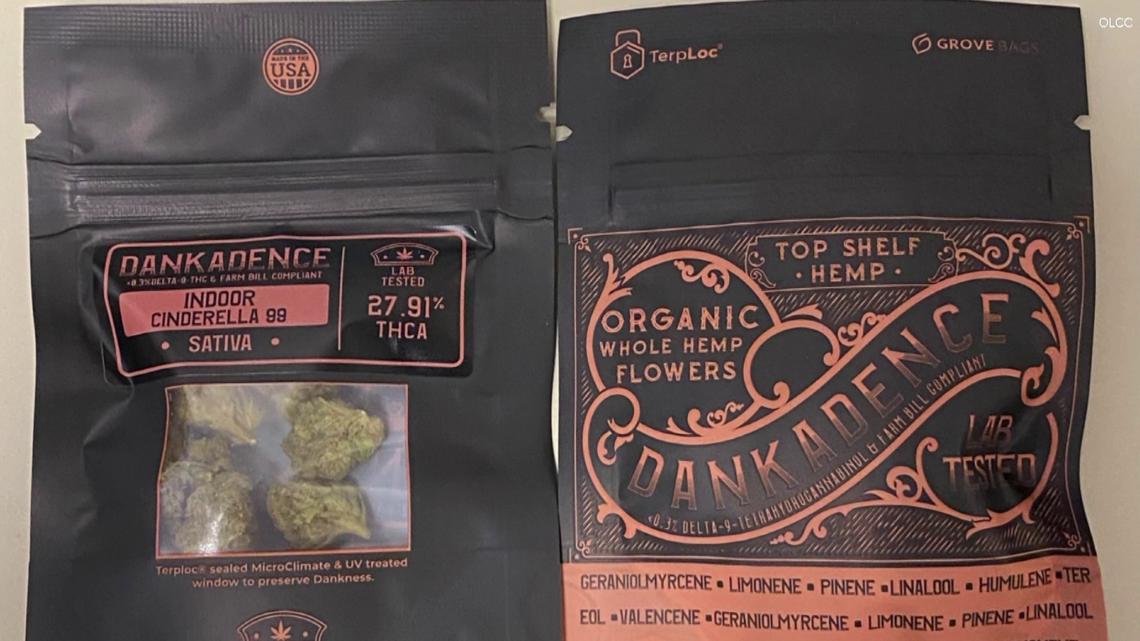SALEM, Ore. — A recent report from the Oregon Liquor and Cannabis Commission (OLCC) took a hard look at hemp products for sale in Oregon, both in stores and online. They found that depending on where it’s purchased, some of the “hemp” could be closer to marijuana, with high concentrations of THC, the main psychoactive compound in cannabis.
The report is the result of a project called “Operation Clean Leaf” where the OLCC looked into several regulatory concerns raised by consumers in the hemp and cannabis markets. The investigation became a pilot project to test out the state’s recently-opened Cannabis Reference Laboratory, which the legislature authorized in 2023.
“For a start, we wanted to take a look at some key issues in cannabis regulation, specifically looking at pesticide contamination, at cannabinoid potency in hemp and marijuana products and at labeling claims on cannabinoid hemp products specifically,” said Steven Crowley, cannabis and education policy analyst at the OLCC.
The lab tested 51 samples of hemp flower, meaning the stuff people would typically smoke, rather than things like hemp lotions or edibles — though they’re waiting on test results for hemp edibles as well. The flower tests were looking for compounds called cannabinoids.
“Basically, the lab took the samples of hemp flower, extracted all the cannabinoids, and then pushed that through a tube that separates those different cannabinoids based on their physical properties with the detector at the end that allows you to quantify how much of those cannabinoids is in there, if you know what you’re looking for,” Crowley explained.
The National Institutes of Health describes cannabinoids as a group of compounds found primarily in the cannabis plant. There are just over 100 different cannabinoids, but consumers generally care about two of them: CBD and THC, specifically Delta-9 THC. CBD is more of a relaxing compound, while Delta-9 THC is psychoactive and found in high concentrations in marijuana.
The OLCC defines hemp as having no more than 0.3% of total THC. But the investigation revealed that every single hemp flower sample tested by OLCC exceeded that level of THC, and some samples had more than 30%, which effectively makes them potent marijuana rather than hemp.
“The findings were pretty interesting,” said OLCC communications director John Brady. “There was significantly more total THC and Delta-9 THC in a lot of these products than is allowed for sale to consumers in Oregon.
“Oregon has a pretty nuanced approach to hemp regulation, and about 60% of the products that we purchased were actually very high total THC products, essentially indistinguishable from the marijuana products, marijuana flower sold in our licensed retail markets.”
Some of the hemp flower products in the investigation were purchased in person in Oregon, and others were purchased online from both in-state and out-of-state retailers.
Brady said it’s important to distinguish between the marijuana and hemp markets in this case. Oregon’s “adult use” cannabis market was created by the passage of Measure 91 in 2015 and consists of physical retail outlets that are licensed and inspected by the OLCC.
Some of those retailers also sell hemp products, but there’s a separate market for hemp products that exists outside of the adult use market, without the same level of regulatory oversight from the OLCC — because in theory, none of the hemp products should contain meaningful amounts of THC.
But the report shows there’s a widespread problem with retailers outside of the adult use market simply ignoring OLCC regulations for things like THC levels, which is concerning because it means consumers might not know exactly what they’re buying when they purchase hemp products.
But the issues don’t stop at hemp that might get you high — there are also concerns about the off-market hemp being sold to minors.
“The hemp flower market, when it’s not operating in compliance with regulations, is really almost entirely removed from all of the the safety elements,” Crowley said. “And additionally, age verification is another issue. To purchase a product at a licensed marijuana retailer, that marijuana retailer checks ID for every purchase. For the hemp flower that we purchased, and particularly the hemp flower that was purchased online, only 13% of those websites did any kind of significant age verification as part of that sale.”
The OLCC said it’s in the process of hiring people to work in undercover sting operations — decoys posing as minors — to bust hemp-only shops that may be selling to teens and kids. That’s a new bit of authority recently granted to the agency, since the hemp-only retail sector doesn’t fall under their usual scope of policing licensed alcohol and marijuana retailers.
Apart from those sting operations, the OLCC is looking to hit retailers where it hurts if they’re caught selling overly-potent or mislabeled hemp flower.
“So based on the results of this investigation, we have been, in some cases we have referred the retail outlets where we purchased this to law enforcement to follow up. We’re also pursuing civil fines through our administrative hearings division,” Brady said.
Other changes are on the way; the state legislature recently ordered the creation of a hemp registry, so starting in 2026 all hemp products will need to be registered with the state, meaning they’ll need ingredient labels to keep consumers informed and proof that the manufacturers have been complying with testing requirements.
OLCC said it does have the authority to pursue civil penalties against out-of-state online hemp retailers, but the agency is focusing its efforts on Oregon-based retailers before turning its attention beyond the state lines.


